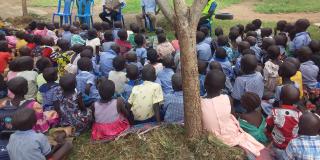
"My name is Faridah Nanyonjo, I’m Ugandan, and I have a background in education. I’ve been working with VSO in Uganda for almost two years now.
My interest in volunteering first started when I was pursuing a professional course in education and pedagogy, which led me to direct teaching roles in the classroom. However, during my time teaching, I often noticed gaps in the system that I couldn’t quite address or find answers to.
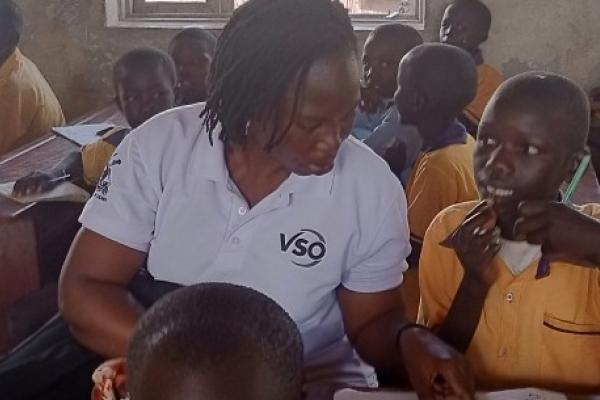
I first became aware of VSO while my sister was volunteering in Cambodia and she encouraged me to join her. I went to Cambodia, not as a volunteer at first, but as an English as a second language (ESL) teacher.
I was given a few classes to teach, and during that time I had the opportunity to work with people from all over the world. Working with these people opened my eyes to many things I hadn’t known while teaching in Uganda.
I joined VSO's Building Learning Foundations project in Rwanda in February 2019 and worked there until September 2021 as a teacher trainer. After that, when I returned to Uganda, I faced some health complications and had to undergo an operation, which was generously sponsored by VSO, for which I’m very grateful.
Following the operation, I took a year off from fieldwork. Then, in August 2022, I joined the VSO's early childhood education project working in the BidiBidi refugee settlement in Uganda, as a teacher educator.
Why did you want to volunteer in your home country of Uganda?
My interest developed when I was working in Rwanda. There were many wonderful things that we accomplished there and I knew for certain that the teachers here in Uganda could benefit from them too.
I believed that some, if not all, of the practices we used while working with teachers in Rwanda would be very helpful for teachers in Uganda. So, I made it my goal to join VSO Uganda and bring those fresh perspectives from the Building Learning Foundations project over to Uganda.
What role do you play on the BidiBidi project?
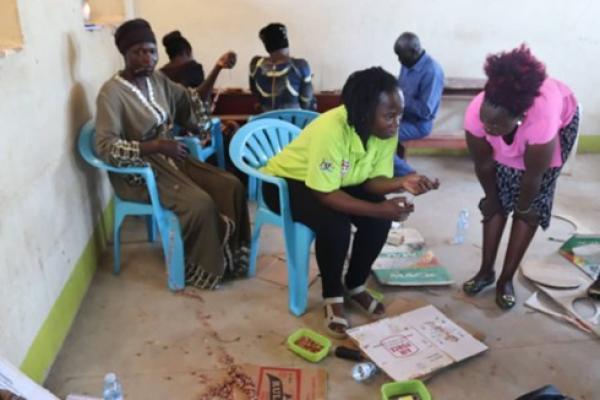
The main focus of the project is to improve access to quality, inclusive education for children between the ages of three and 10, within the Bidibidi refugee settlement. Since we are targeting children, we engage regularly with teachers, parents community members, and the Ministry of Education and Sports, here in Uganda.
As a teacher educator, I work with primary school teachers, specifically those teaching at primary one level. In my role, I aim to expand the reach of the education project by adding fresh perspectives from my past experiences and ensuring long-term sustainability. Even after the project ends, we want the impact of our work to remain. It’s important that the community can sustain the practices that we've put in place.
I work closely with parents because we want to encourage local participation. This isn't something that VSO volunteers can do alone! We have school management committees for primary schools and centre management committees for the early childhood care and education (ECCE) centres.
I work with these committees to raise awareness, not just about the project but also on how to run the schools, focus on their vision and mission, and realise the future they want for their schools.
I also focus on capacity building and curriculum support. While we have a curriculum, it needs significant support. I help teachers develop and adapt teaching materials to suit the needs of their learners, especially since they don’t have access to manufactured materials. We often create materials using local or recycled materials from the community to support the curriculum.
Another part of my role involves collecting data and monitoring progress. I do this through classroom observations and by working with district officials who join us in the monitoring process. Together, we identify gaps, assess areas for improvement, and collaborate with teachers and schools to address these issues.
What was it like when you first arrived?
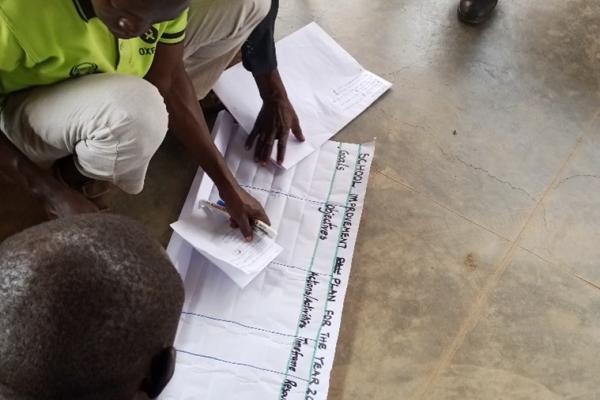
There was a great need for this project because, as you can imagine, when refugees enter a new place, it’s empty. There are no schools, no hospitals—nothing is there. When I first arrived there were only a few ECCE centres.
Most of our ECCE centres started under trees or in open spaces with no buildings or structure. That’s where the real need was.
The host community provided us with spaces, and they worked with us to put up temporary structures for the children. Some of our structures are still temporary, but the learners are there, and it has greatly improved access to education.
Many children, who would have otherwise stayed home without any education, are now able to attend school. This has helped to improve their literacy and skills at an early age. So, the project was very much needed, and it continues to be needed.
What changes have you seen within the community?
The teachers I interacted with were dedicated to their jobs, but they were initially frustrated. Many of the children struggled with basic reading and math skills due to a lack of resources and a lack of modern teaching methods. The teachers felt like, no matter how much effort they put in, the children wouldn’t reach even half their potential.
When I began working with the teachers and building their capacity, their mindset started to shift, little by little. We’ve been taking steps to improve their thinking. We trained them on how to use inclusive teaching methods because, for them, the initial thought was that all the children were simply slow learners.
We also provided training on psychosocial support since many of the children were traumatised. We helped the teachers with lesson planning and introduced more hands-on activities like group work.
Now, instead of relying solely on pen and paper assessments, they’ve started using group work and interactive activities.
We also introduced literacy and numeracy clubs, giving children different ways to engage. The impact has been noticeable as the teachers now have a list of keywords and strategies they can use during lessons, and they see that the children can achieve more.
As for the community, the response has been very positive. When they talk about VSO within their circles, they share positive stories. The teachers also been very open with me about the challenges they face in running and supervising the schools, which shows they have trust and confidence in me.
I’ve seen that our relationship goes beyond just the schools. They also talk to me freely about matters in their personal lives. It’s clear that the connection I’ve built with the community is strong, and they feel comfortable discussing both professional and personal issues with me.
Was there a particular moment when you realised the impact you were making?
Yes, there are many, but I'll talk about one specific teacher who works in a primary school. He's a very dedicated teacher, but he often expressed his frustration with the school administration and he was discouraged by the poor results from his students.
I remember finding him one day scoring a literacy test, and all the students were below 30%. He said, "I don’t know what to do with the children. I’m doing my best, but I’m still not getting the results I thought I would." He felt like he was working too hard but not seeing the expected outcomes.
At that point, I stepped in to offer guidance. By providing additional training, I supported him in lesson planning and setting different types of work. With that kind of support, he began implementing some of the strategies he had learned, such as pair work, group work, and outdoor activities. Slowly but surely, he started noticing changes in his learners.
This improvement in his mindset helped him see progress in his students’ performance. He specifically teaches numeracy, which often requires the use of materials because many concepts can be quite abstract.
As a result, he became more open to incorporating hands-on learning, and that shift has made a real difference in his teaching and his students' learning.
How has volunteering impacted you personally and professionally?
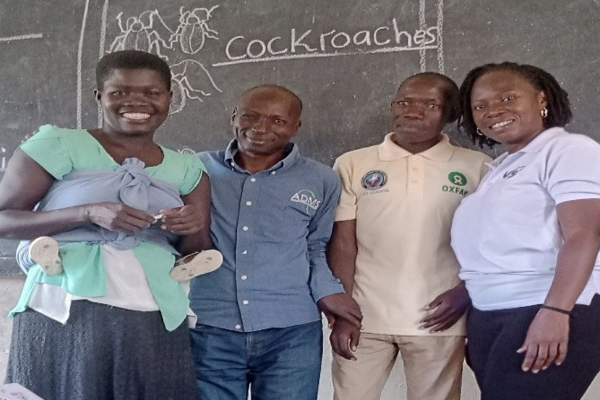
Professionally, this project has contributed significantly to my growth. When I first joined, I had very little knowledge of budgeting, planning, and budget analysis. These are all areas where I’ve developed considerably while working on this project.
I feel I've grown into a more seasoned professional, capable of handling a variety of tasks beyond my core expertise in education. On a personal level, this project has also strengthened my resilience. I've faced many challenges that required perseverance and problem-solving, and rather than giving up, I’ve had to push through and find solutions.
What challenges did you face and how did you overcome them?
One significant challenge I faced was the issue of mindsets. The work we do involves changing people’s perceptions, particularly regarding child-centred teaching approaches.
In Uganda, convincing teachers, parents, and the community to see the value in allowing children to play as part of their learning was difficult. For instance, when I suggested taking children outdoors for educational games, many teachers and parents saw it as a waste of time, believing that this approach would prevent them from completing the syllabus.
Over time, though, I was able to shift some mindsets. Not all, but a few teachers now recognise that play and learning can go hand in hand. It was a significant challenge to help them see this and understand that the children were not just playing but learning as well.
The education system in Uganda is not yet fully supportive of play-based learning, so this added to the difficulty. However, through persistence, we’ve seen some progress.
Consistency has been key in challenging these attitudes. Regular mentorship, coaching, and school visits helped me overcome this. I also involved people from within the system, which helped create a sense of collaboration. When mentoring and coaching sessions took place, I made sure to invite others to participate, making it a team effort to show how these changes could be implemented in practical terms.
What does 'active citizenship' mean to you?
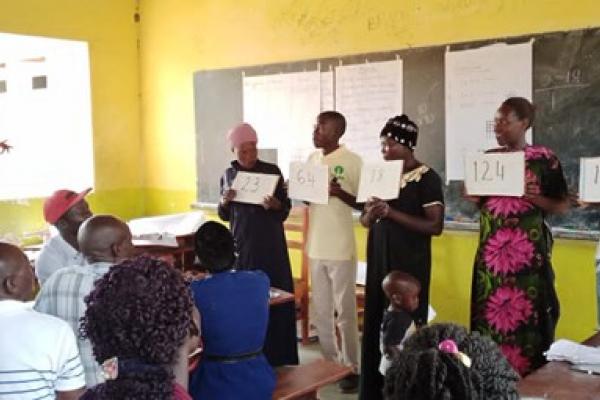
Active citizenship, to me, is about individuals and communities raising their voices to hold duty bearers accountable and push for better service delivery. As a volunteer working within VSO, I’ve developed my skills in advocacy, which has allowed me to push for improved service delivery in various sectors, not just education.
In Uganda, where the VSO approach integrates multiple areas, we often include health workers in our gatherings to teach them how to voice their concerns to those in power. The use of tools like the Intersectionality Community Scorecard and Measuring Impact for Learning and Empowerment (MILE) has been particularly valuable in streamlining this process.
These approaches have not only benefited the communities we serve but have also shaped my own growth as an advocate and volunteer.
What do you think is unique about VSO's approach to development?
Youth volunteering is immensely valuable, offering experiences and exposure that are hard to come by elsewhere. Through volunteering, young people gain skills that they can use in the future to improve their lives. VSO’s approach is unique because it emphasises continuous learning.
There’s always an opportunity for growth through training, whether it’s through the Kaya online learning portal or other platforms. VSO doesn't leave its volunteers as they are; it elevates them through learning opportunities, which is something I’ve found distinctive compared to other organisations. This constant learning and development make VSO stand out.
What advice would you give to something thinking of volunteering with VSO?
To anyone considering volunteering, I would say give it a shot—it’s a meaningful, rewarding experience with real impact on the communities you'll work with.
My advice would be to lower your expectations before starting, especially when working in very poor communities. You may find that people know less than expected but coming in with no expectations helps you approach the experience with an open mind and makes it easier to integrate and make a difference.
What drives your passion for volunteering?
My passion is fuelled by the desire to give children a better learning experience than I had. My own school days were filled with trauma, where corporal punishment was common.
I dream of creating an environment where children can learn in a friendly, engaging atmosphere, free from fear. Seeing children happy and excited about learning is what motivates me every day in this work.
What are you aspirations for the future?
I hope to see a smooth transition for the students as they move up to their next classes. I want them to feel confident and unafraid as they move from one teacher to another, knowing that they’ll continue to learn in a supportive environment.
Personally, if I get another opportunity to volunteer, I will gladly take it. Beyond that, I plan to continue pushing my career in education to new heights."
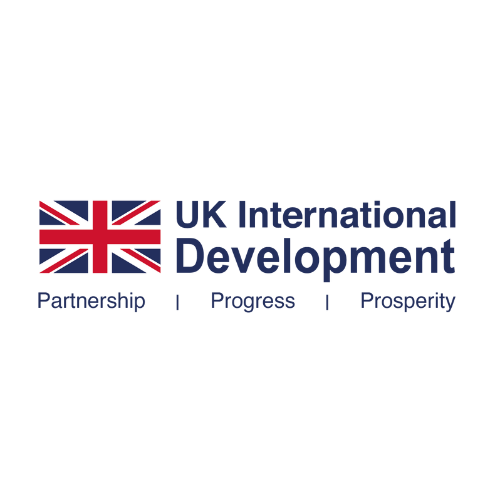
The ACTIVE programme
ACTIVE aims to reach 2.5 million people across 19 countries by mobilising marginalised groups, such as women, young people and those with disabilities, to act on the issues that are most important to them and their communities.
This funding will help strengthen locally led organisations and create a culture of active citizenship – where marginalised people actively engage with their own development - whilst building the capacity of the UK’s partner countries to respond to the needs of their citizens across healthcare, education and livelihoods.
Read more
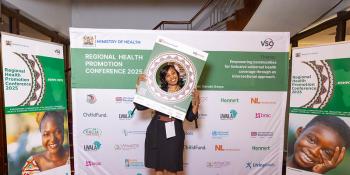
In photos: Our Regional Health Promotion Conference 2025
Check out some of our favourite photos from Regional Health Promotion Conference (RHPC25). This event sought to reimagine Universal Health Coverage through the lens of intersectionality.
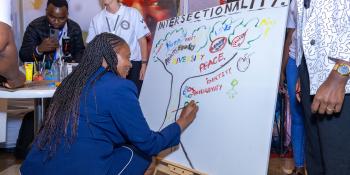
Using intersectionality to create healthy beginnings and hopeful futures
World Health Day brings global attention to the urgent need to end preventable maternal and newborn deaths. Learn more about how our Regional Health Promotion Conference is tackling these issues head on.
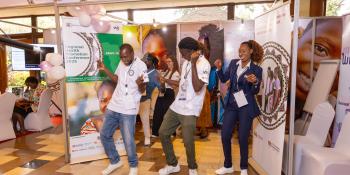
Highlights from the Regional Health Promotion Conference 2025
The Regional Health Promotion Conference 2025 reimagined Universal Health Coverage (UHC) through the lens of intersectionality, by bringing together experts from across East Africa and beyond.
